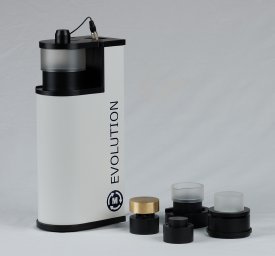Feb 23 2011
Mercury Scientific Inc is proud to announce the addition of a new static powder flow tester, Evolution Powder Tester, to its existing powder testing product line. This new Evolution Powder Tester (EPT) is a economical and easy to use powder flow tester that measures the unconfined yield strength of a material (a critical flow property) at pressures up to 500KPa.
The unconfined yield strength can be measured at one pressure or at many different pressures in order to create a flow function. The flow function presents the material's gain in strength as more pressure is applied to it.
The Evolution Powder Tester (EPT) offers many advantages over traditional shear and other uniaxial testers. The EPT is a standalone instrument designed just for powder testing and is not an accessory to a general purpose instrument. This allows the design to be cost effective, easy to operate and suitable to any laboratory or manufacturing environment. In addition, it takes approximately 3 minutes for a user to test one sample. This is significantly less testing time than other shear or uniaxial testers.

With the EPT, time consolidation tests can be performed with sample cells and weights that allow a material to be subjected to various pressures over long periods of time. The EPT time cells are designed so that they can be easily placed in ovens or humidity chambers to study their effects on materials in storage situations. Studying the effects of humidity and pressure over long periods of time are difficult with traditional shear testers and uniaxial testers. The analysis cells for many these instruments are very expensive and do not include the means of applying pressure for significant periods of time.
Mercury Scientific also offers the Revolution Powder Analyzer for dynamic powder flow testing. With both instruments, our customers are able to study the effects of all different processes and environmental conditions on their materials during handling, transportation and storage. Mercury Scientific now offers both instruments with their accessories together as a package at a discounted price. This package price is roughly one quarter of the price of competing technology or of assembling individual instruments from other manufacturers for the same tests.